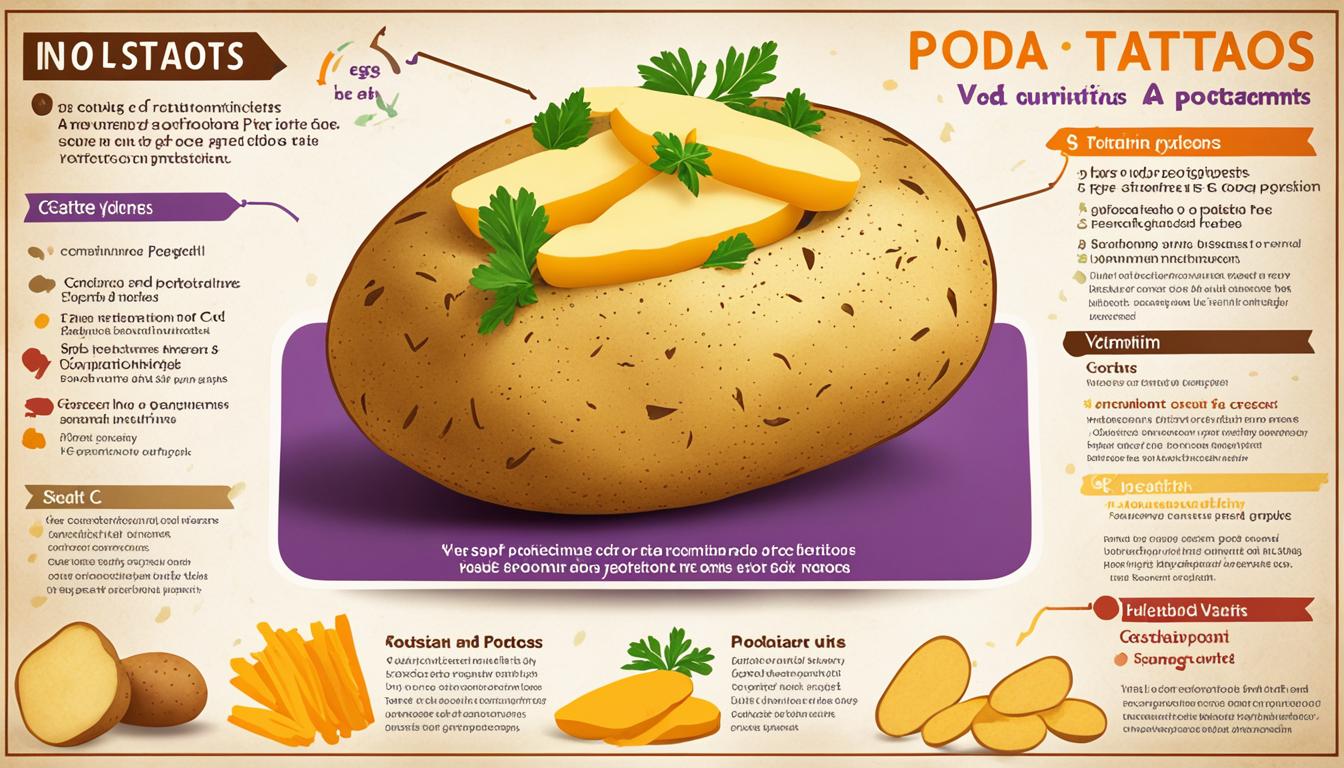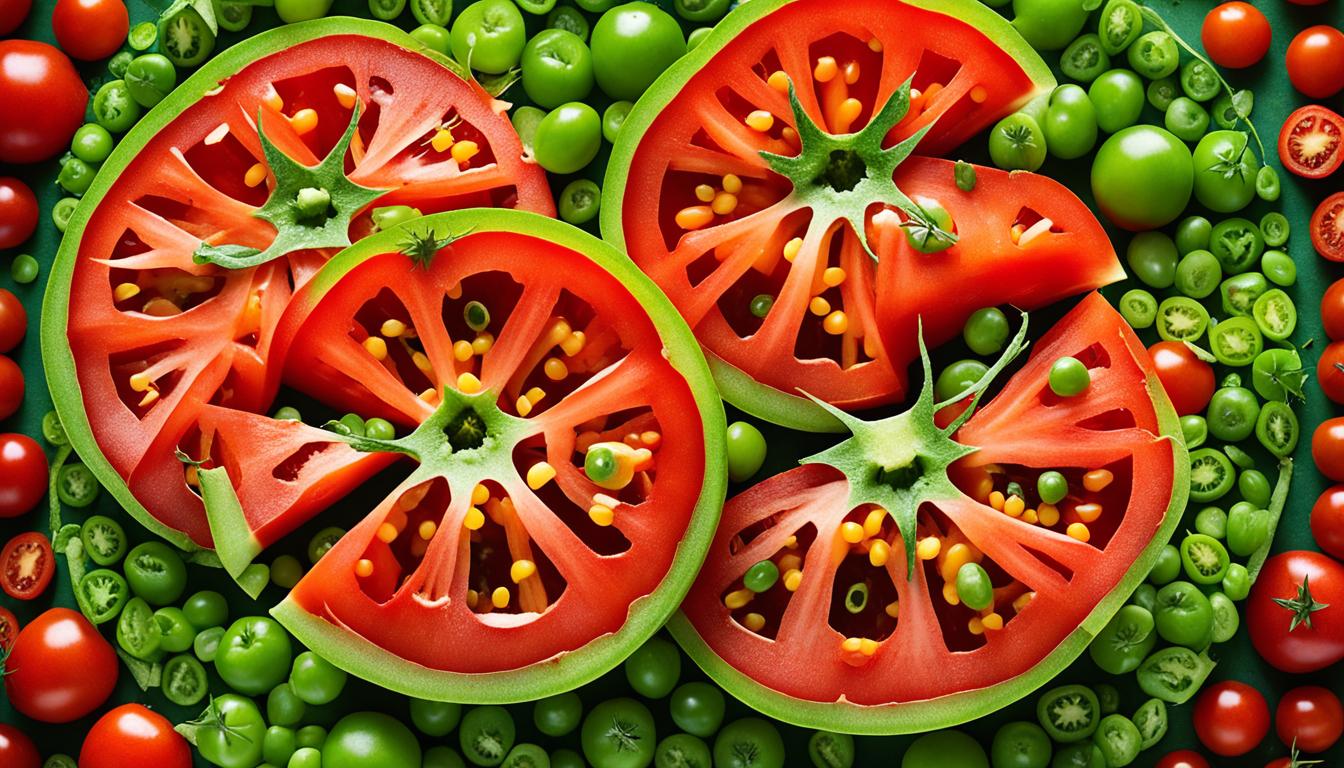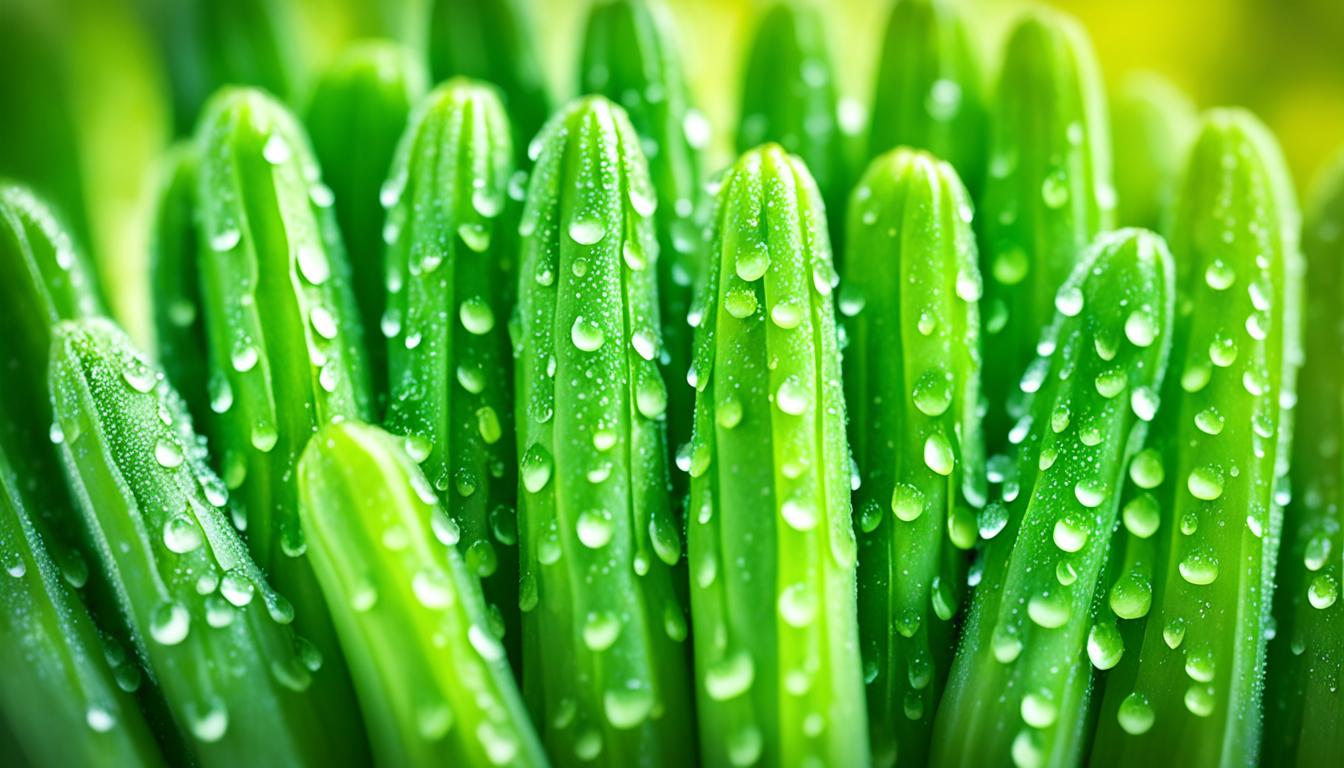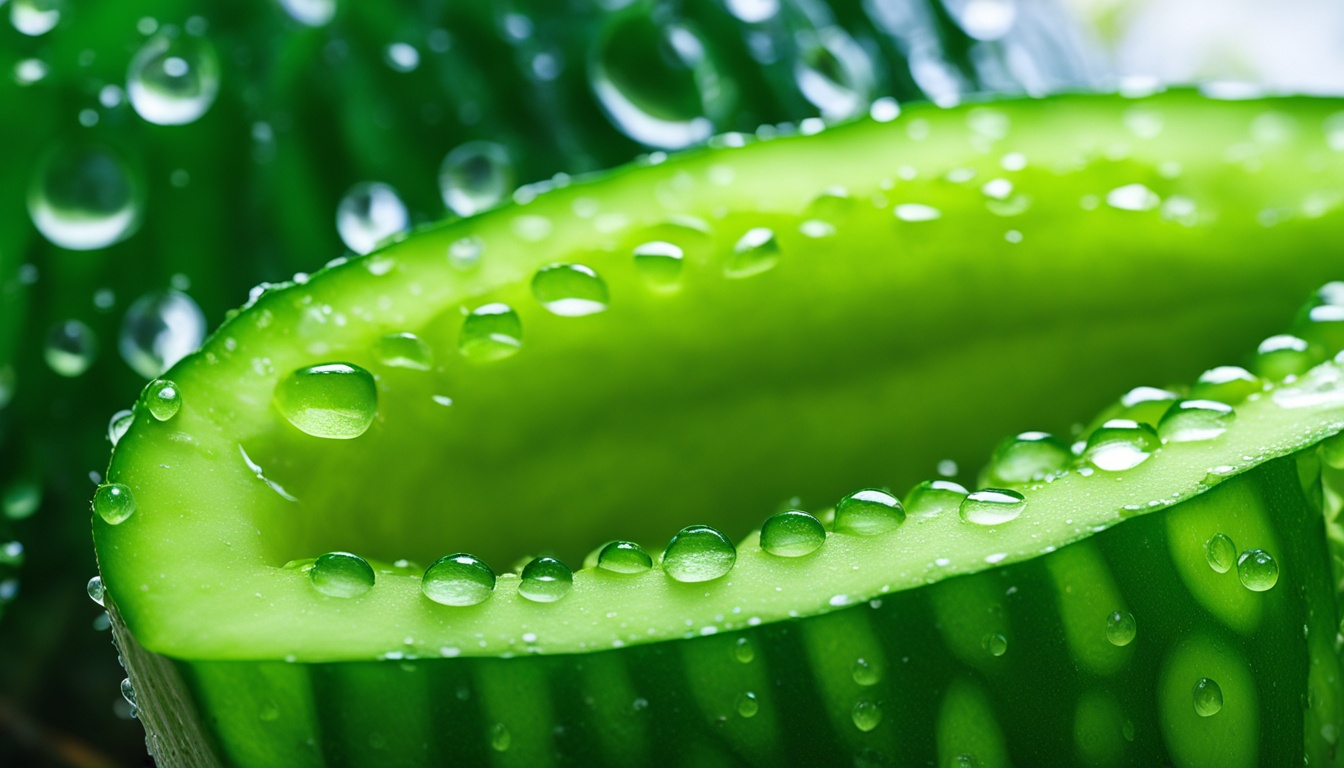Did you know a medium baked russet potato has 164 calories? It’s surprising, right? It’s mostly carbs. But it does have some protein and very little fat. This makes potatoes a great choice for getting important nutrients.
Potatoes come from under the ground. They’re the roots of the potato plant, called Solanum tuberosum. People all over the world enjoy potatoes by boiling, baking, or frying them. They are often part of meals and snacks. Despite what you may have heard, potatoes can be healthy if you prepare them right.
Key Takeaways:
- Potatoes are a nutritional powerhouse, providing essential vitamins, minerals, and beneficial plant compounds.
- They are composed primarily of carbohydrates, with moderate amounts of protein and fiber, and only a trace of fat.
- Potatoes are a good source of dietary fiber, especially when consumed with the skin.
- Potatoes are rich in vitamins and minerals, including vitamin C, vitamin B6, potassium, folate, iron, and magnesium.
- Potatoes can be a healthy part of a balanced diet when prepared properly, such as baking, roasting, or boiling.
Nutritional Composition of Potatoes
Potatoes are mostly made of carbohydrates and have a fair amount of protein and fiber. When cooked with the skin, they are packed with important vitamins and minerals like potassium and vitamin C. While they’re full of water, they’re also high in carbs.
Carbohydrates and Fiber
The tiny bit of fat in potatoes is divided between saturated and polyunsaturated fat. They also contain a dash of omega-3’s and omega-6’s. Being a vegetable means they’re cholesterol-free. Their carbohydrate content can be from 60 to 80% of their weight. The skin of potatoes has about 1 to 2% fiber, and dried skins are mostly fiber, around 52%.
Protein Content
Potatoes have a low protein content, about 1-2% fresh. That’s around 1.9 grams of protein in 100 grams.
Vitamins and Minerals
Vitamin C and potassium stand out in potatoes. They’re also rich in vitamin B6, and folate.
| Nutrient | Amount per 100g | % Daily Value |
|---|---|---|
| Calories | 87 | – |
| Carbohydrates | 20.1g | – |
| Protein | 1.9g | – |
| Fiber | 1.8g | – |
| Vitamin C | 14.4mg | 19% |
| Potassium | 620mg | 18% |
| Vitamin B6 | 0.6mg | 10% |
Potatoes also have lots of plant compounds. The skin is rich in polyphenols. Purple or red-skinned potatoes are especially high in polyphenols. The most common type is chlorogenic acid.
Potatoes and Glycemic Index
Potatoes usually have a high glycemic index. This makes them not the best choice for those with diabetes. The type of potato and how it’s cooked can change how quickly it affects blood sugar.
Factors Affecting Glycemic Index
Potatoes come in different types, from low to high GI levels. Potatoes usually have a high glycemic index (GI), typically averaging in the 80s, which is considered high. But, the GI can be as low as 53 for some types to over 100 for others. How you cook them and the potato variety matters.
Cooling cooked potatoes can reduce their impact on blood sugar. It can lower their GI by 25–26%. Types like fingerling or red potatoes have a lower GI. However, potatoes like Russet and Idaho, that are more starchy, have a higher GI.
Resistant Starch in Potatoes
Potatoes also contain resistant starch. Compared to hot potatoes, cooled ones offer higher amounts of resistant starch. This special fiber benefits gut health by supporting good bacteria and improving digestion.
The GI of a food is important but not everything. Studies suggest focusing only on the GI might not be best for blood sugar management. It’s key to look at the whole meal, including protein, fats, fiber, and sugar alcohols. This is especially true for people with diabetes. They should see how potatoes affect them personally and adjust their portion sizes based on their overall meal choices.
Health Benefits of Potatoes
Potatoes, especially with the skin, are good for you. They are rich in minerals and plant compounds. These can reduce your blood pressure. The high potassium in potatoes is key.
Studies show that eating more potassium lowers blood pressure and heart disease risk.
Heart Health and Blood Pressure Regulation
Potatoes can help with weight management. They make you feel full, which cuts down on eating. An old study found potatoes are the top food for keeping you full among 40 others.
These tubers are rich in healthy carbs and fiber. They’re a power snack, packed with vitamin C, B vitamins, and potassium. This mix makes potatoes important for a healthy diet.
Satiety and Weight Management
Potatoes can fill you up. This helps manage your weight by lowering how much you eat. A study placed potatoes above 40 common foods for how full they make you feel.
They are full of good carbs and fiber. This gives you energy and keeps you full. Potatoes are also rich in important nutrients like vitamin C, B vitamins, and potassium. They should be part of a balanced diet.
Potatos Nutrition Facts
Potatoes are packed with nutrients like essential vitamins and minerals. They also provide beneficial plant compounds. When you eat cooked potatoes with their skin, you get a lot of potato vitamins and potato minerals. These include potassium and vitamin C. Potatoes are high in water and made up mostly of potato macronutrients. They have some protein and fiber, but very little fat.
A medium baked russet potato (173g) includes the skin but no salt or toppings. It has 164 potato calories. Carbs make up 88% of those calories, while protein is 11%, and fat is just 1%.
If you eat a medium potato (150g) with its skin, you get a good amount of vitamin C and potassium. It offers 27 mg of vitamin C (45% of the Daily Value (DV)), 620 mg of potassium (18% of DV), and 0.2 mg of vitamin B6 (10% of DV). You also get small amounts of other key nutrients.
Plant Compounds in Potatoes
Potatoes are full of good plant compounds. Many of these are in the skin. Potatoes with purple or red skin hold the most potato polyphenols. These are a kind of potato antioxidant. The top polyphenol in potatoes is chlorogenic acid. Plus, they have catechin, another antioxidant.
Potatoes don’t just have polyphenols. They also carry healthy potato antioxidants for your well-being. Most of these are in the skin. This includes chlorogenic acid and lutein, which is a carotenoid.
Glycoalkaloids
Potato glycoalkaloids are another thing in potatoes. They are toxic phytonutrients. Potatoes make these to protect themselves from bugs and other dangers. But, too much can cause harm to us.
Potato Allergies and Intolerances
While most people do fine with potatoes, some might react badly to parts of them. A potato allergy isn’t common, but folks can be allergic to patatin, a major potato protein. If you’re allergic to latex, you might also react to patatin.
Potatoes are in the same group as tomatoes, eggplants, and peppers, known as the nightshade family. Some think eating these can worsen arthritis pain. Although, science doesn’t firmly link nightshades to arthritis discomfort.
Patatin Protein Allergy
If you have a potato allergy, it’s likely from the patatin protein. This allergy might show up as itchy skin, throat swelling, or worse, wheezing or a belly ache. Severe cases could even lead to a dangerous allergic reaction needing quick medical help.
Nightshade Sensitivity
Since potatoes are in the nightshade family, folks allergic to nightshades could react to them too. Though the link between nightshades and arthritis isn’t clear, some people feel more joint pain after eating them.
Eating too many potatoes could be harmful due to the glycoalkaloids. This might cause headaches, gut pain, and other issues. But, real potato toxicity cases are few, and often not noticed.
| Potato Allergy Symptoms | Potato Intolerance Symptoms |
|---|---|
|
|
If you’re allergic to potatoes, avoid any foods made with them. For a potato intolerance, a food sensitivity test can help find the problem. If eating potatoes bothers you, it might help to stop. Talking to a doctor or nutrition expert is a good idea if you have issues with potatoes or similar vegetables.
Acrylamides in Potatoes
Acrylamides are something to watch out for when eating potatoes. They form when you cook potatoes at high heat. This happens mostly when you fry, bake, or roast them. Acrylamides aren’t in fresh, boiled, or steamed potatoes. But, you can find them in fried, baked, or roasted potatoes. How much acrylamides are in your food depends on how hot and for how long you cook it.
Formation and Potential Risks
In research with animals, acrylamides seemed linked to cancer and problems with the brain and nerves. But for humans, the link to cancer is only a possibility. Studies in people haven’t shown clear harm from foods with acrylamides. Remember, the amounts of acrylamide in potatoes that you eat are lower than what was harmful in animals. Cooking potatoes too long and at very high heat makes the most acrylamide. Yet, you can lower these levels by boiling potatoes first or using certain antioxidants.
Preparing and Storing Potatoes
Cooking Methods and Nutrient Retention
The way we prepare potatoes can change their health benefits. Baking, roasting, and boiling them keeps their good stuff like vitamins and antioxidants. Add healthy toppings for even more nutrients.
Cooling cooked potatoes boosts a special fiber in them called resistant starch. This kind of starch is great for your health. It helps with blood sugar and gut health.
Proper Storage Techniques
To keep potatoes fresh and nutritious, how you store them is crucial. Keep unwashed potatoes in a cool, dark, and humid place. A paper bag is better than plastic. Never keep them in the fridge. This can make a harmful substance called acrylamide.
Also, don’t eat green potatoes. They might have too much solanine, which is toxic. Knowing how to store potatoes well keeps them good for you to eat.
Potato Varieties and Types
Potatoes come in many varieties with different looks and tastes. The main types are white, yellow, and red. But you can also get blue and purple ones. Each variety might differ in texture and flavor.
For instance, purple potatoes contain flavonoids, which are healthy. Sweet potatoes are quite different from these. They look different and have their own unique taste and nutrition.
Some types with too many glycoalkaloids are not safe to eat. They can’t be sold to the public. Because of this, some varieties are not available due to safety concerns.
| Potato Variety | Calories (per 3.5 oz) | Carbohydrates (g) | Fiber (g) | Protein (g) | Potassium (mg) |
|---|---|---|---|---|---|
| Russet Potatoes | 168 | 39 | 3 | 5 | 888 |
| Red Potatoes | 149 | 34 | 4 | 4 | 969 |
| Purple Potatoes | 110 | 26 | 4 | 2 | 438 |
| Yellow Potatoes | 110 | 26 | 2 | 3 | 620 |
| White Potatoes | 174 | 33 | 5 | 4 | 867 |
Based on the USDA Food Database, here is the nutrient density ranking for potatoes: Red Potato, White Potato, Russet Potato, and finally Sweet Potato.
Conclusion
Potatoes are nutritious and can fit well in a balanced diet. They come packed with vitamins, minerals, and healthy plant chemicals. Eating them with the skin is best for a boost of nutrition. Though potatoes have a high glycemic index, it’s not a big worry if you cook and eat them right. The way you store and cook them can keep their nutrients high.
Knowing about potato nutrition summary, key potato health benefits, and potato preparation and storage can help. This info helps people choose wisely when adding potatoes to their meals. Potatoes are good for your heart and your gut. Plus, they are budget-friendly and nutritious if you prepare them well.
In moderation and with other healthy foods, potatoes are a great choice. They are versatile, budget-friendly, and full of good nutrition. That’s why they should be a regular part of many Americans’ diets.
FAQ
What are the key nutrients found in potatoes?
How do potatoes affect blood sugar levels?
What are the health benefits of consuming potatoes?
Are there any concerns regarding potato consumption?
What are acrylamides and how do they relate to potato consumption?
How should potatoes be prepared and stored to preserve their nutritional value?
What are the different varieties of potatoes and how do they differ?
Source Links
- https://www.verywellfit.com/are-potatoes-good-for-you-2506382
- https://www.healthline.com/nutrition/foods/potatoes
- https://www.webmd.com/diabetes/carbs-potatoes-blood-sugar
- https://www.verywellfit.com/why-do-potatoes-raise-blood-glucose-more-than-sugar-2242317
- https://health.ucdavis.edu/blog/good-food/potato-health-benefits-and-why-you-should-eat-more-spuds/2022/05
- https://www.healthline.com/nutrition/benefits-of-potatoes
- https://www.health.com/nutrition/are-potatoes-healthy
- https://www.ncbi.nlm.nih.gov/pmc/articles/PMC10146029/
- https://link.springer.com/article/10.1007/s12230-018-09705-4
- https://www.healthline.com/health/food-nutrition/potato-allergy
- https://www.medicalnewstoday.com/articles/317886
- https://www.yorktest.com/allergy/potato/
- https://www.fda.gov/food/process-contaminants-food/acrylamide-and-diet-food-storage-and-food-preparation
- https://extension.usu.edu/nutrition/research/potatoes
- https://www.healthline.com/nutrition/how-to-store-potatoes
- https://hgic.clemson.edu/factsheet/using-storing-potatoes/
- https://www.patriciabannan.com/blog/nutrition/the-ultimate-guide-to-the-different-types-of-potatoes/
- https://www.intake.health/post/healthiest-potatoes-4-varieties-ranked-by-nutrient-density
- https://www.livestrong.com/article/465529-what-kind-of-potatoes-are-the-healthiest/
- https://apre.org/wp-content/uploads/2018/07/Potato-White-Paper-Final.pdf




